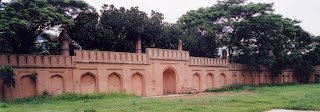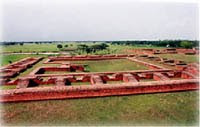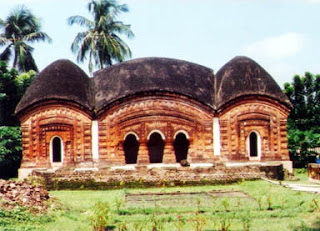







ARCHAEOLOGICAL WORKS IN BANGLADESH AND ITS FUTURE
Archaeology is a fascinating modern science which is increasinglybecoming popular in the world for its un-limited scope ofRediscovering Civilizations and culture s long extinct. In advancedcountries many scientific methods are used to expand our knowledgedeeper into the past using infallible material evidences of man andhis environment. It extends the horizon of un- recorded history andPrehistory to an infinite range. In the absence of any Recordedhistory the only unerring source of piecing together man’s activitiesand progress on our planet is the material remains that he has leftbehind in the form of Monuments, arts and Crafts, various objects ofdaily use, Inscriptions, coins etc. which are known asAntiquities.Scientfic excavation and study of such antiquitiesfaithfully preserved by nature in stratified sites for centuries,reveal a fairly accurate picture of lost civilization and culture.
Archaeological Investigation in less than hundred years havesucceeded in unfolding astonishing details of PrehistoricCivilizations which flourished in Egypt,Mesopotamia,the Indus Valley,Crete and Mycenae to such an extent that the historical periods ofmany countries have failed to produce. Despite globalisation, the reality of each individual city is unique and complex.
There are no "urban models" of reference, only case studies. I hope that the architects,
urbanists and mayors who have kindly agreed to participate in this conference will demonstrate to us,
through such case studies, the ways in which each city's future can be anchored in its individual identity.
Let us all strive to protect and build an "urban heritage" as the basis for developing urban policies for the city of the future, the city of the new, democratic age.
In the over-populated cities of the developing South, other than in a few "museum towns", the demolition of entire historic urban sectors, the abandonment of unique historic buildings, and the construction of new buildings that are incongruous, to say the least, with the integrity of the historic urban fabric are combining to transform the cities' very identity. Furthermore, work to upgrade roads and improve mass transport systems, while necessary, may unfortunately be done without due regard to maintaining the integrity of historic centres.
If the essence of heritage protection is to preserve the ingenuity of the past for future generations, as well as to stimulate new creations, heritage must have a meaning in contemporary society. This is a fundamental precept of the World Heritage Convention, contained in Article 5. For heritage preservation that denies modernity, that obstructs development, that attempts to freeze time, would be counter-productive to the ultimate goal of human progress.
Archaeology is a fascinating modern science which is increasinglybecoming popular in the world for its un-limited scope ofRediscovering Civilizations and culture s long extinct. In advancedcountries many scientific methods are used to expand our knowledgedeeper into the past using infallible material evidences of man andhis environment. It extends the horizon of un- recorded history andPrehistory to an infinite range. In the absence of any Recordedhistory the only unerring source of piecing together man’s activitiesand progress on our planet is the material remains that he has leftbehind in the form of Monuments, arts and Crafts, various objects ofdaily use, Inscriptions, coins etc. which are known asAntiquities.Scientfic excavation and study of such antiquitiesfaithfully preserved by nature in stratified sites for centuries,reveal a fairly accurate picture of lost civilization and culture.
Archaeological Investigation in less than hundred years havesucceeded in unfolding astonishing details of PrehistoricCivilizations which flourished in Egypt,Mesopotamia,the Indus Valley,Crete and Mycenae to such an extent that the historical periods ofmany countries have failed to produce. Despite globalisation, the reality of each individual city is unique and complex.
There are no "urban models" of reference, only case studies. I hope that the architects,
urbanists and mayors who have kindly agreed to participate in this conference will demonstrate to us,
through such case studies, the ways in which each city's future can be anchored in its individual identity.
Let us all strive to protect and build an "urban heritage" as the basis for developing urban policies for the city of the future, the city of the new, democratic age.
In the over-populated cities of the developing South, other than in a few "museum towns", the demolition of entire historic urban sectors, the abandonment of unique historic buildings, and the construction of new buildings that are incongruous, to say the least, with the integrity of the historic urban fabric are combining to transform the cities' very identity. Furthermore, work to upgrade roads and improve mass transport systems, while necessary, may unfortunately be done without due regard to maintaining the integrity of historic centres.
If the essence of heritage protection is to preserve the ingenuity of the past for future generations, as well as to stimulate new creations, heritage must have a meaning in contemporary society. This is a fundamental precept of the World Heritage Convention, contained in Article 5. For heritage preservation that denies modernity, that obstructs development, that attempts to freeze time, would be counter-productive to the ultimate goal of human progress.

Nice one...Just I like ur blog...:)
উত্তরমুছুনthanx...:D